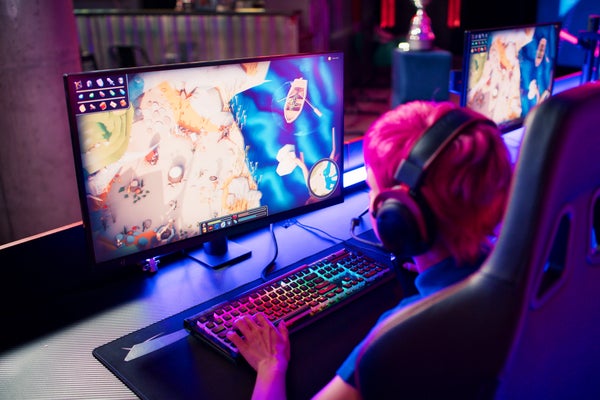When Real Life Is Hostile, LGBTQ+ Gamers Find Friendship Online
Many LGBTQ+ video gamers use gaming to build community, especially in jurisdictions that are considering anti-LGBTQ+ legislation

Janiecbros/Getty Images
When Texas-based fitness instructor Fabby Garza came out as transgender, the first friends she told were those she’d made playing online games. She waited three more years before she started presenting as feminine in the real world. “Once I finally came out, I had to change the way I lived my life. Taking the bus suddenly became incredibly dangerous. I would get harassed and had strange men follow me off the bus, trying to coerce me into having sex with them,” Garza says. “But when I got home and played Final Fantasy XIV or Overwatch or Fortnite with friends, they used my name and pronouns. They allowed me to be myself in a place that was actively hostile toward me.”
Many gamers with a marginalized sexual orientation or gender identity use the gaming world to express themselves freely despite real-life hostile environments. This is especially common for people in jurisdictions that have adopted or are considering anti-LGBTQ+ legislation. These gamers defy the American stereotype of the white male player—also presumed to be heterosexual and cisgender—whose tastes the video game industry had historically catered to. A recent report from the LGBTQ+ advocacy organization GLAAD found that nearly one in five heavy gamers (those who spend 10 or more hours a week playing) is LGBTQ+. That’s higher than previous results; a 2020 Nielsen survey found that 10 percent of such highly engaged gamers were LGBTQ+.
The GLAAD survey reports that LGBTQ+ gamers are 11 percent more likely than straight, cisgender players to use gaming to “escape from difficult situations in the real world” and 24 percent more likely to use it to get through “tough times.” A majority (66 percent) of these respondents said gaming lets them express themselves in a way they’re not comfortable with doing in the real world. That includes coming out as LGBTQ+, which nearly a dozen people interviewed for this story said that gaming has helped them do.
On supporting science journalism
If you’re enjoying this article, consider supporting our award-winning journalism by subscribing. By purchasing a subscription you are helping to ensure the future of impactful stories about the discoveries and ideas shaping our world today.
“A way to think of games is less of escapism and more as ‘embrace-ism’—that is, finding people who will embrace you fully and fulfill the needs that you cannot fulfill in other areas of your life,” says Karen Schrier, a games professor at Marist College, who has written two books on the subject. “They are also civic communities, just like the town hall, coffee shop [or] school or religious center.”
Digital environments have been LGBTQ+ havens since at least the early 1990s, when online chat rooms became a way to build community and coordinate activist events to raise awareness about AIDS. Similarly, games offer a way for LGBTQ+ players to reach others who may not live nearby, according to Cody Mejeur, an assistant professor of games studies at the University at Buffalo—something they experienced firsthand. “I grew up in a conservative part of the Midwest, in a community where being queer or trans was shunned,” Mejeur says. “Religious trauma and conversion trauma were common. In that setting, I had to hide who I was the vast majority of the time and only felt safe expressing myself more openly online.”
Gaming also provides a playful way to test what it’s like to live as a person of a different gender. Garza says she could explore her identity by playing indie games such as Butterfly Soup,about gay girls who play baseball and fall in love, and One Night, Hot Springs, in which a trans woman visits a hot spring in Japan. Garza could also role-play as an android who develops intimate relationships with other trans women. “The cyberpunk trans erotica game Hardcoded helped me finally come to terms with who I am and what I wanted for the rest of my life,” she says.
LGBTQ+ identities aren’t just represented in small indie games. Blockbuster games and gaming platforms can also encourage player expression. Roblox, an online platform with 70 million daily players, found in a report on Gen Z users that respondents who identified as LGBTQ+ were more likely to have become comfortable dressing their avatars in a gender-fluid way in 2023. “Growing up as a closeted gay child, virtual worlds and gaming platforms like Roblox created spaces where it didn’t matter to anyone who I was or what I looked like,” says Samuel Jordan, a 24-year-old who runs a successful fashion business in Roblox. “I was free to explore expressing myself in whatever way I felt comfortable, without fear of real-world judgment. I came out as gay for the first time while on Roblox, which later gave me the confidence to do so in my personal life.”
Jordan lives in Florida, where it has been “disheartening to live through” the anti-LGBTQ+ legislation that state leaders have pushed—including a law that prevents educators from teaching children in kindergarten through third grade about gender or sexual identity.“Our governor has chosen to broadcast a message of hatred, otherism and intolerance in a quest to fuel his run for the president of the United States,” Jordan says, referring to Florida governor Ron DeSantis’s now suspended campaign.
Although harassment and homophobia are also prevalent in many online communities, Mejeur points out that avoiding bigots can be simpler online than in real life: “I could just block a bully or load into a different game to get away from them, and that wasn’t always possible at school or church or another in-person venue.” They note that even in games with communities that have notoriously homophobic reputations, such as Call of Duty or World of Warcraft (both franchises that Mejeur loves), LGBTQ+ players still find each other.
In 2019 Bo Ruberg, a game studies professor at the University of California, Irvine, published a book entitled Video Games Have Always Been Queer, which argues that the LGBTQ+ community can carve out supportive spaces in online games despite hostility. “For queer and transgender people who are experiencing increasing societal and political discrimination today, video games don’t offer an escape,” Ruberg says. “But they do offer a chance to feel happiness or explore new realities while [people are] still living within the very real and often dangerous reality that surrounds them.”
Ruberg wasn’t surprised by the GLAAD survey results but says that those statistics may have thrown other people for a loop. “People from outside games (and often more mainstream gamers) tend to think that video games have no place for queer people,” Ruberg says. “But we’re here now, and we’ve always been here!”

